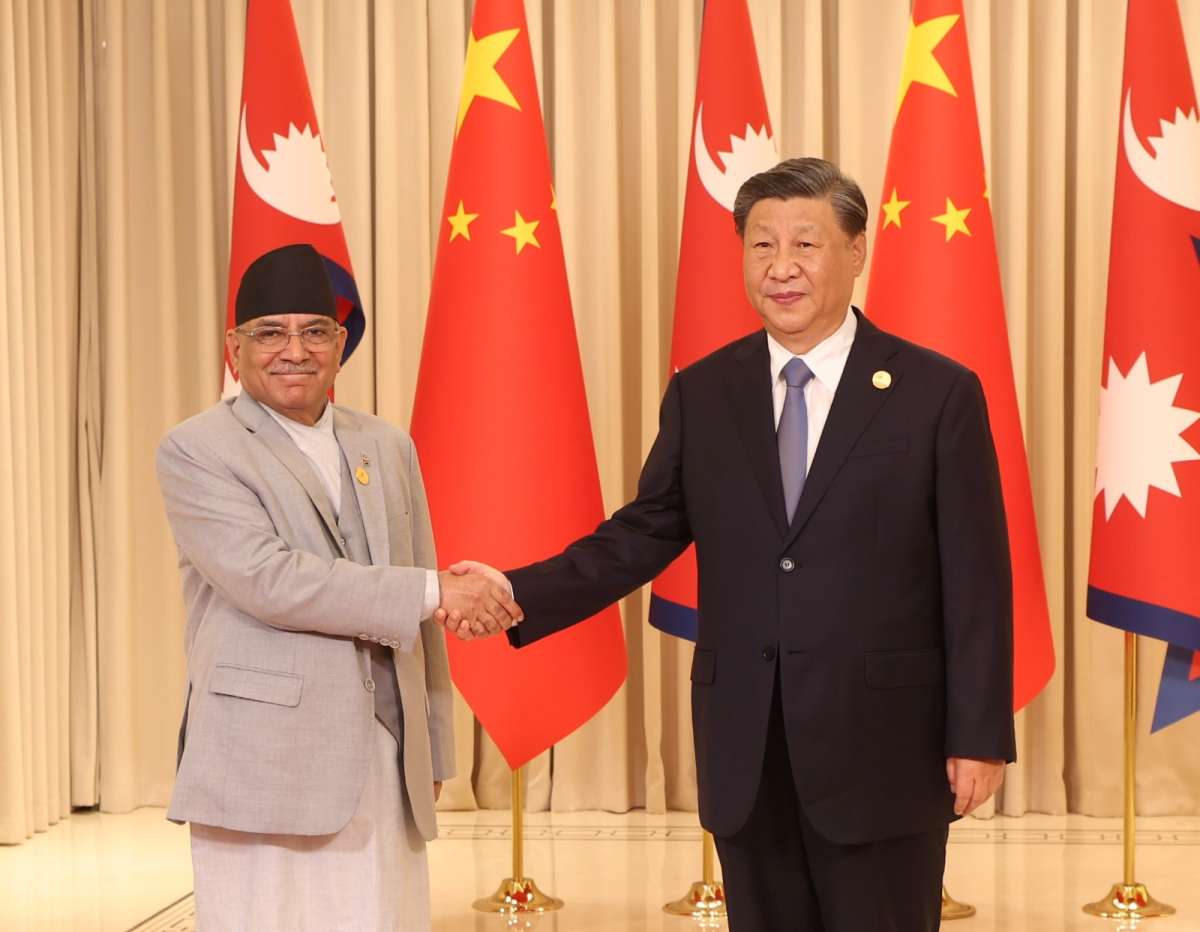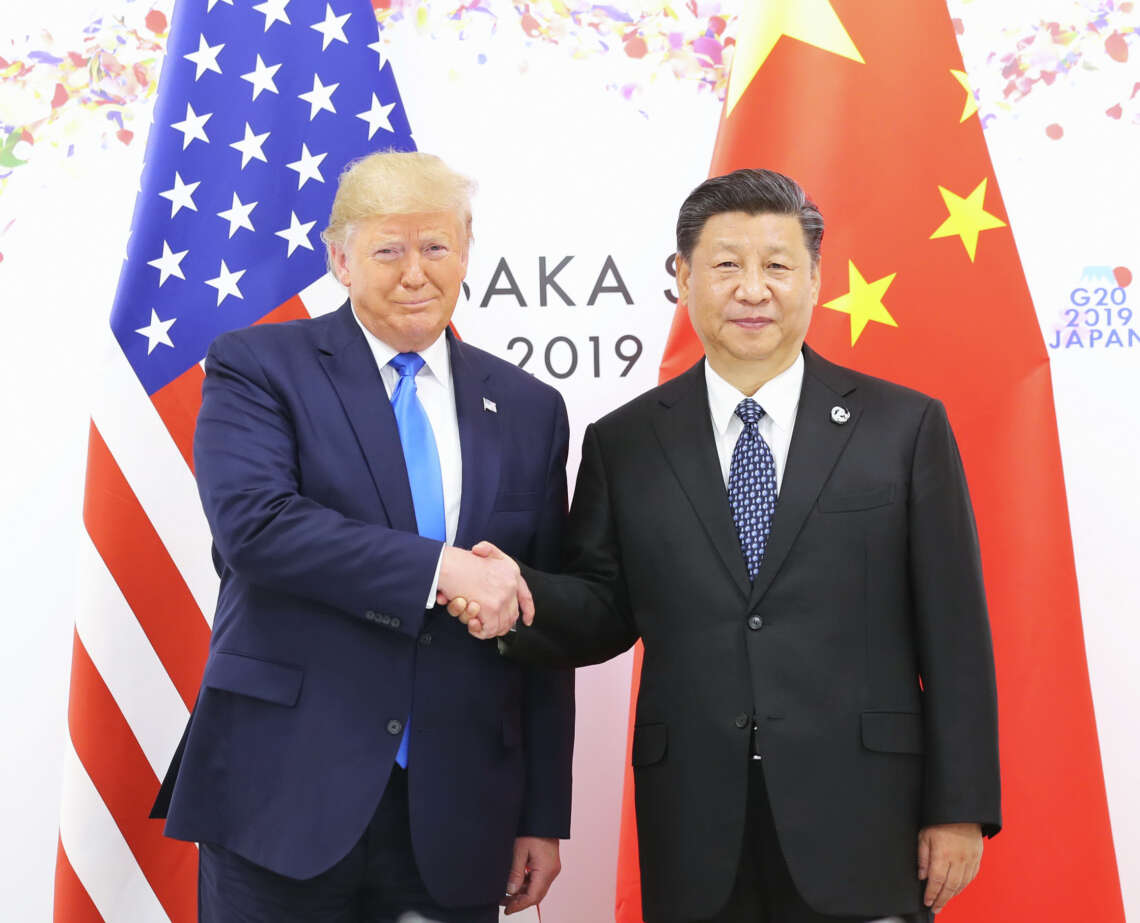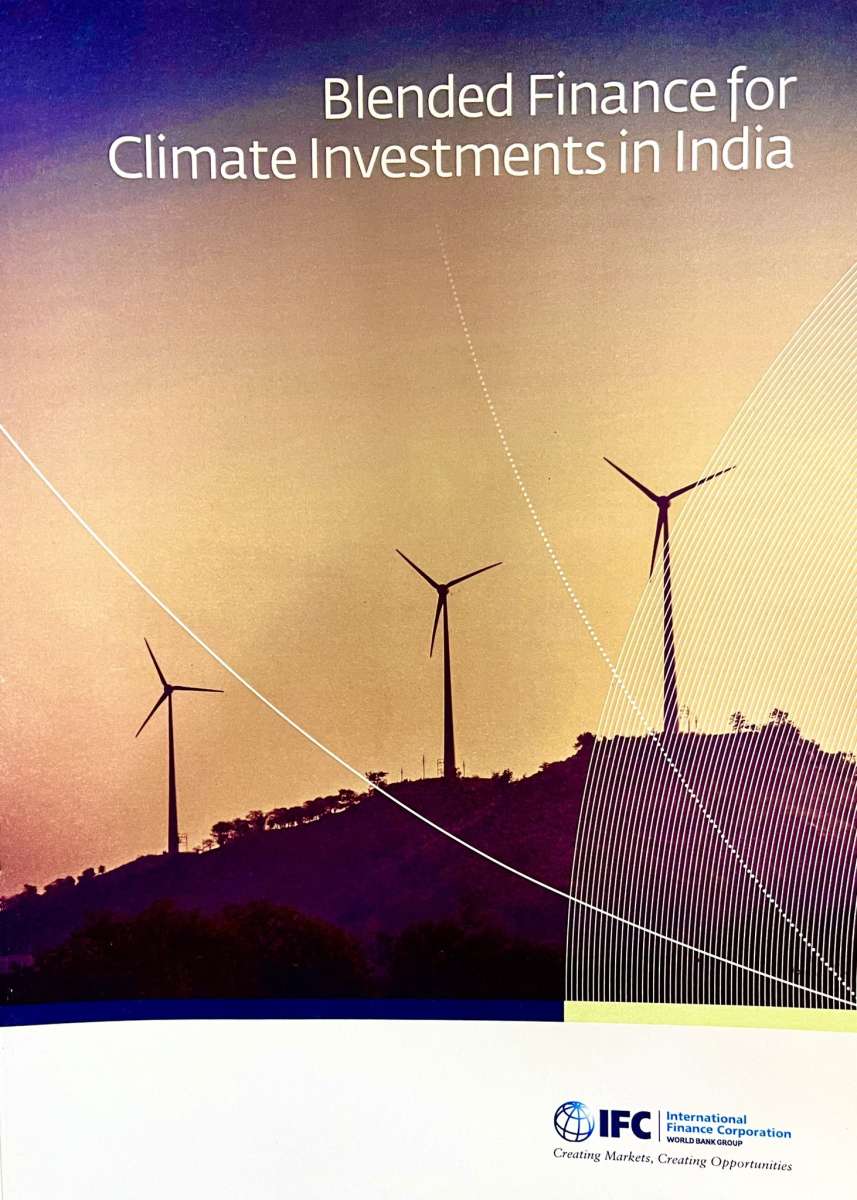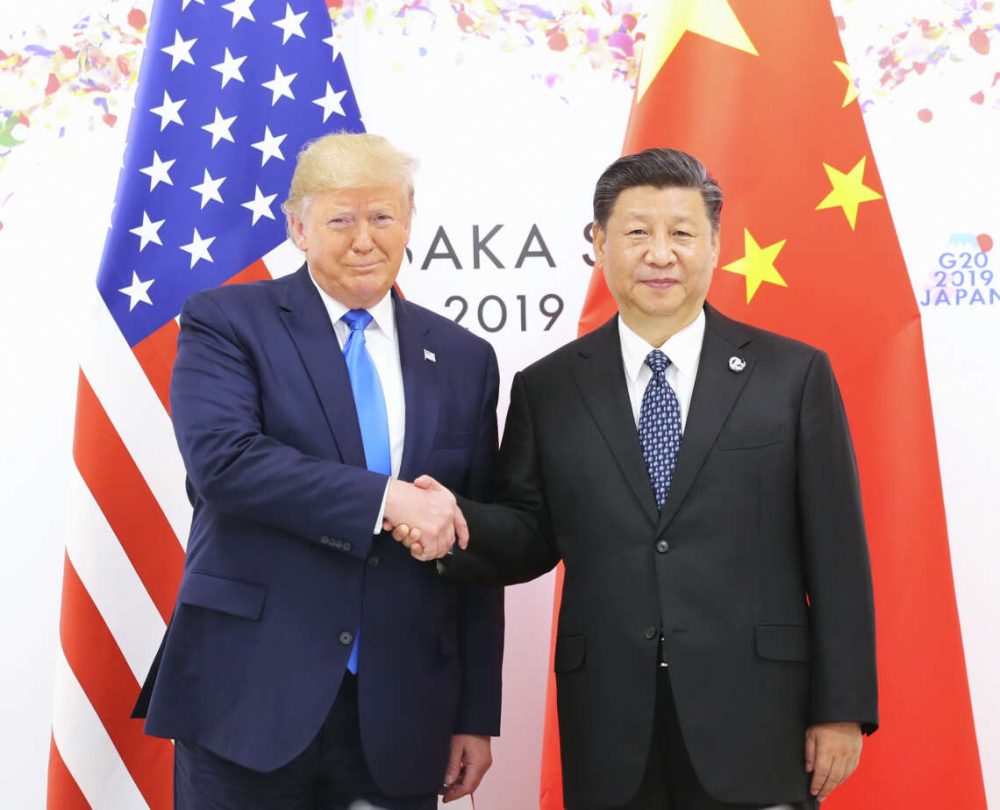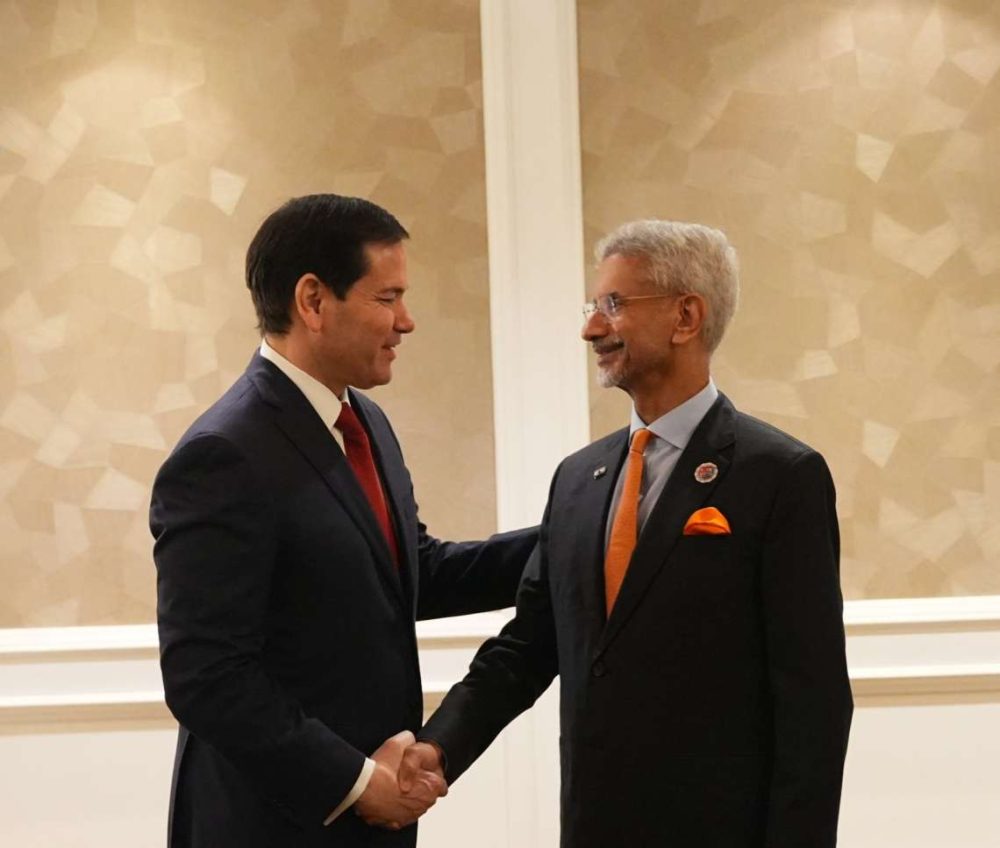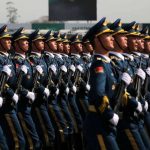Nepal’s Prime Minister Pushpa Kamal Dahal walks tightrope in Beijing, signs host of agreements with China but not one under Belt and Road Initative (BRI), writes Prithvi Shrestha…reports Asian Lite News
Nepal and China have signed several agreements during Nepali Prime Minister Pushpa Kamal Dahal’s ongoing visit to Beijing but not one has been categorised as a Belt and Road Initiative (BRI) project.
The two sides, however, expressed readiness to deepen cooperation in areas such as infrastructure, connectivity, trade, tourism and investment while further deepening Belt and Road engagements to deliver greater benefits to their peoples, according to the Joint Statement issued after the delegation level meeting between Dahal and his Chinese counterpart Premier Li Qiang on Monday. By not endorsing BRI, Dahal has kept India’s senisitivities in mind, as New Delhi opposes BRI as it infringes its sovereignty. The China Paksitan Economic Corridor, BRI’s flagship project passes through Gilgit Baltistan, which India says is part of its sovereign territory.
The two sides agreed to launch the construction of the Jilong/Kerung-Rasuwagadhi-Chilime 220 KV Cross-Border Power Transmission line at an early date.
Even though the main focus of BRI is to enhance connectivity, the project that is aimed at diversifying Nepal’s electricity supply chain away from India, was not brought under the BRI umbrella.
In fact, the Nepali embassy in China didn’t mention a word about BRI when it issued a press statement on Monday after the delegation level meeting.
“We heard that Prime Minister Dahal expressed his commitment to implement BRI. But the Nepali embassy failing to mention anything about BRI is surprising,” Rajeshwar Acharya, former Nepali ambassador to China, told India Narrative.
According to foreign policy experts, besides the 220KV transmission line project, the two sides failed to sign agreements on connectivity projects and none of the agreements signed fell under the BRI ambit.
Nepal and China signed the Memorandum of Understanding (MoU) on BRI in May 2017 but so far, no project has been developed under the mega infrastructure project.
Though the Chinese embassy in Nepal categorised Pokhara International Airport in western Nepal as BRI project in June, Nepal Foreign Minister Narayan Prakash Saud rejected the claim in Parliament saying that two sides are yet to reach agreement on BRI implementation plan.
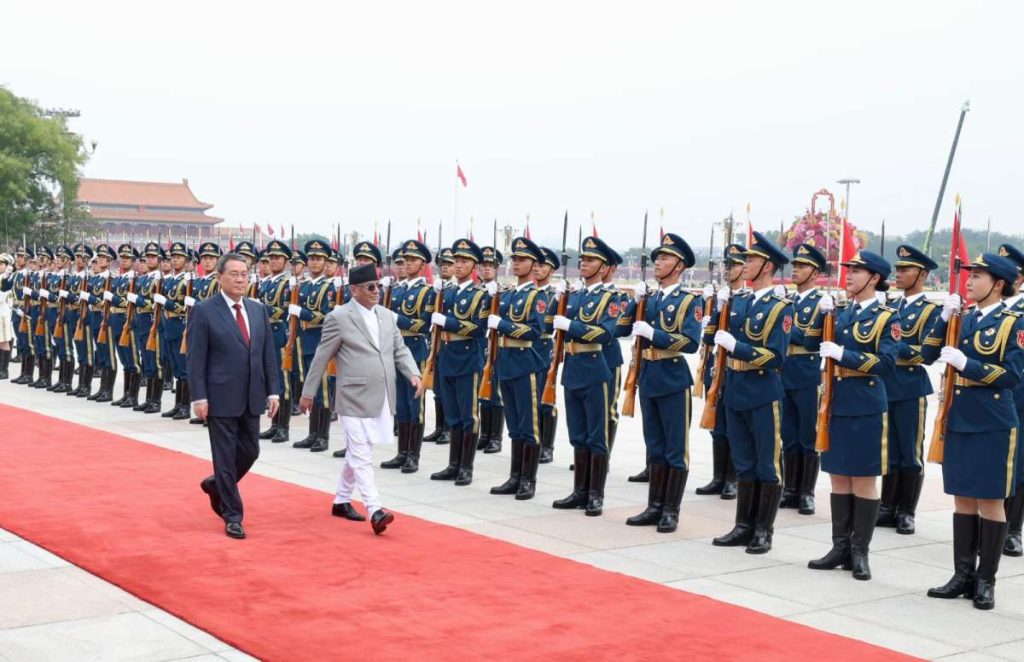
According to the joint statement, two sides expressed their commitments to accelerate the consultations to finalise the text on the BRI Implementation Plan at an early date.
“One of the important bones of contention is whether Nepal would accept grants or loans or both from China,” Former Foreign Minister Narayan Khadka told the India Narrative in a recent interview. “We are in favour of implementing the BRI projects through grants.”
Nepal is concerned about taking loans from China, which may be available at higher interest rates. That apart, there is concern about the financial viability of many connectivity projects including the cross border railway. This, according to Khadka, is a matter of concern even if the Chinese side makes funds available in the form of grants or soft loans.
Nepal also failed to endorse the Global Security Initiative (GSI) Global Civilization Initiative (GCI) proposed by the Chinese side, reflected in the joint statement.
“The Nepali side supports the GDI proposed by China, and will consider joining the Group of Friends of the GDI,” the joint statement says. Nepal, however, has been reluctant to support the GSI which Prime Minister Dahal clarified, in an interview with Nepali newspaper- Kantipur—published on Sunday.
Dahal stated that China is initiating the GSI, the GCI and the GDI. “Among these, there is no hesitation to participate in the GDI,” he said. “But we cannot wade into security-related issues. It is our stated policy not to be under the umbrella of any side. Ours is a non-aligned foreign policy. On the other hand, we are saying the American Indo-Pacific Strategy and State Partnership Program are part of security initiatives. If we are not taking part in one initiative [IPS, SPP], we cannot join others too,” Dahal had stated.
Nepali embassy’s statement on Monday did not mention anything on Kathmandu’s position on these Chinese initiatives.
According to the joint statement, the two sides agreed that the Dahal’s visit was of great significance to advancing the China-Nepal Strategic Partnership of Cooperation.
China, failing to receive a nod from Nepal in its vital initiatives, raised questions about whether two countries enjoy strategic partnership.
When Chinese President Xi visited Nepal in October 2019, it was described as a high point of bilateral relations. During his visit to Nepal for the first time in 23 years, the two sides had decided to elevate Nepal-China Comprehensive Partnership of Cooperation to Strategic Partnership of Cooperation according to a joint statement issued after Xi’s visit.
But notably, nothing was made clear what the strategic partnership entailed with many wondering if the pact had a military dimension that could invite the ire of New Delhi.
“It appears that two sides reached agreement on neither BRI nor other initiatives launched by China. This has created doubt whether they have any strategic partnership,” said Acharya, former Nepali ambassador to China. “It may be due to a trust deficit between the two sides.”
Earlier, Dahal had avoided visiting Boao Forum in March despite Beijing’s invitation as he waited for the New Delhi visit first. He paid a visit to India in late May and early June.
When Dahal became Prime Minister for the first time in 2008, he had first visited Beijing, breaking the long-held tradition of Nepali Prime Ministers visiting the southern neighbour first.
In February, Prime Minister Dahal ditched his then coalition partner CPN (UML) which had supported him to become Prime Minister in December last year. Many consider this coalition was forged at the behest of Beijing but remained short lived with many blaming New Delhi’s hands in breaking this alliance. Then, Dahal returned to the old coalition partner—Nepali Congress and has been running the government with the country’s largest party’s support along with the other smaller political parties.
Meanwhile, foreign policy analysts said that Dahal appears to have failed to regain trust of Beijing during this visit. Vijay Kant Karna, former Nepali ambassador to Denmark and a close observer on Nepal’s foreign policy, told India Narrative that Nepal’s continued reluctance to endorse GSI and GCI was a setback for Beijing even though it was the right call on the part of the Nepali Prime Minister.
“Nepal cannot be part of any military alliance,” he said. “How would Nepal respond if India also asks Nepal to sign to be part of its own military alliance?”
On the other hand, Nepal refused to endorse Beijing’s template of BRI implementation plan as it is. “With Nepal failing to endorse Beijing on a number of China’s interests, there is no sign of strategic partnership between Nepal and China,” said Karna. “Nepal’s obvious Beijing-friendly policies adopted since 2016 have taken a break. Such a policy was taken to end New Delhi’s hegemony in Nepal,” said Karna.
However, even as Nepal and China failed to reach consensus on the BRI Implementation Plan, GSI and GCI, the Chinese side has secured Nepal’s support against Taiwan Independence.
While Nepal had been supporting the view that Taiwan is an inalienable part of Chinese territory, it is for the first time Nepal stated that the Nepali side is against “Taiwan independence.”
The Nepali side reiterated that Tibet affairs are China’s internal affairs, and that it will never allow any separatist activities against China on Nepal’s soil. “Based on the joint statement, we can assume that China feels its security has been threatened and it wants unequivocal support about its position on the ‘One China Policy,’” Dinesh Bhattarai, former foreign policy advisor to then Prime Minister Sher Bahadur Deuba said. “China could secure such support from Nepal.”
According to the joint statement, China also insisted on cooperation on law enforcement between the two sides with both agreeing to further strengthen information exchange, capacity building and cooperation on training between their law enforcement institutions. “This suggests China is more concerned about the security of Tibet,” Bhattarai said.
When it comes to agreements signed during Dahal’s visit, Nepal’s foreign policy experts questioned whether signing those agreements required visits from Nepali Prime Minister.
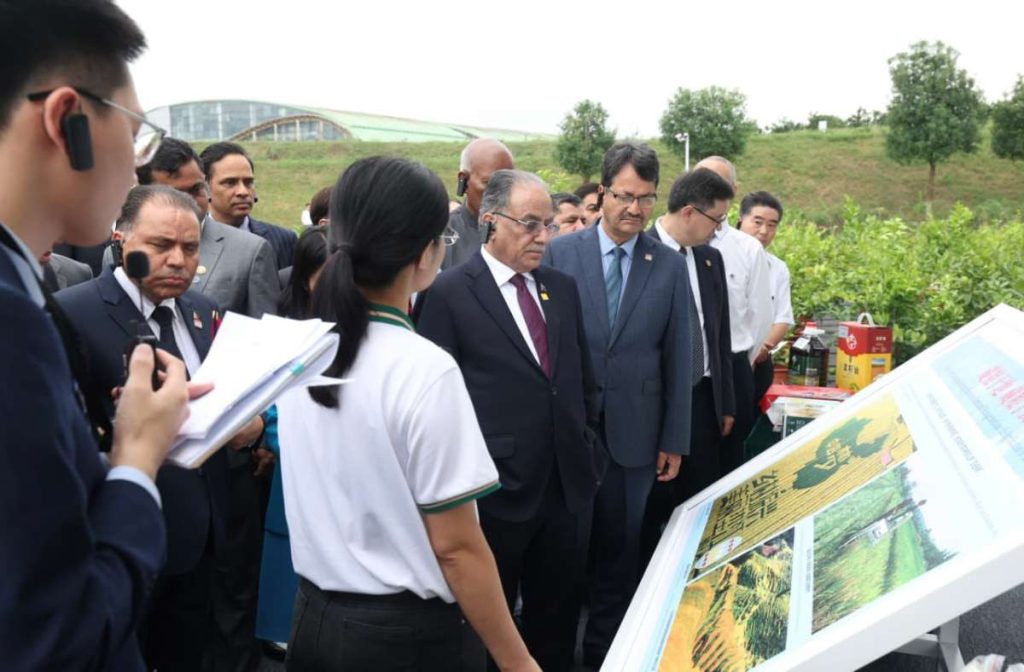
Besides signing agreements on the cross border power line, the two sides also signed an agreement on enhancing the digital economy and development of green and low-carbon energy and an agreement to cooperate for the development of agriculture, livestock and fisheries. They also reached agreement on the protocol of phytosanitary requirement for the export of plants from Nepal for medicinal production in China.
The northern neighbour expressed readiness to speed up the approval process for the export of cooked buffalo meat products from Nepal to China, which Kathmandu and Beijing view as a positive step towards reducing trade imbalances between the two countries.
Signing of MoU on the establishment of Joint Technical Working Group to review and modify Nepal-China Trade and Payment Agreement signed in 1981 and consensus reached in translating the publication of ancient texts are among the other bilateral agreements signed during Dahal’s visit.
The two sides also signed an agreement to cooperate in the fields of science, technology and innovation as well as another MoU on construction of Hilsa-Simikot Road in western Nepal was signed.
“Majority of agreement signed during Dahal’s visit would not require Prime Minister-level visits,” said Acharya, former Nepali ambassador to China.
He revealed that he had suggested to the Prime Minister before his departure to New York that he should seriously discuss with the Chinese side about Nepal’s massive trade deficit with its northern neighbour, allegation of border encroachment from China and a recent map published by China that had invited criticism from several countries in China’s neighbourhood.
Nepal also opposed Chinese maps about its border after it failed to include Nepal-claimed Lipulekh, Kalapani and Limpiyadhura region into Nepal’s territory even though Nepal in 2020 had brought these regions under its political map inviting scorn from India, which also claimed these regions as its own.
“I think there is certain political distrust between the two sides (Nepal and China) as political leadership in Nepal is divided over whether there has been border encroachment from China,” Acharya said. “Misunderstanding between Nepal and China came into the open once the Chinese embassy categorised Pokhara International Airport as a part of BRI.”


